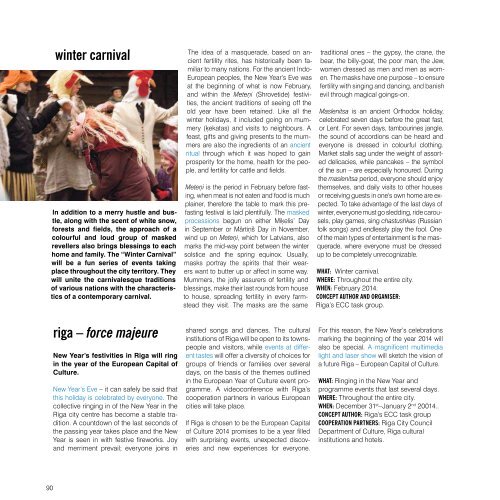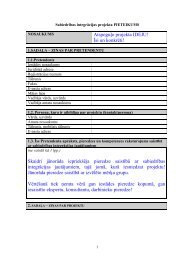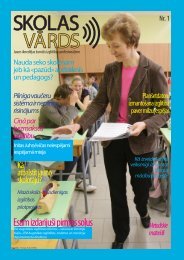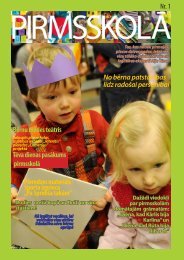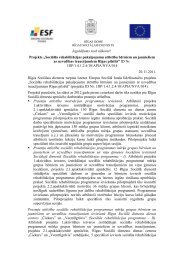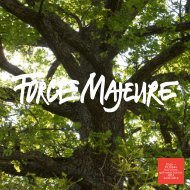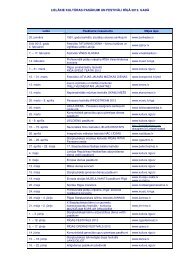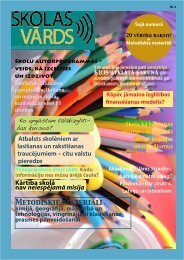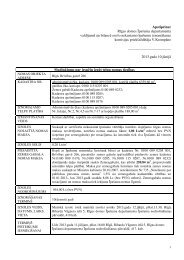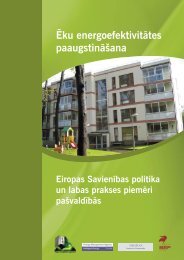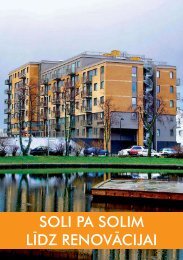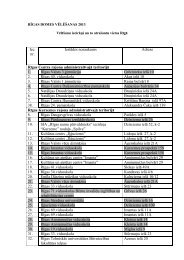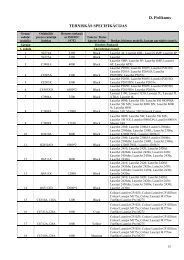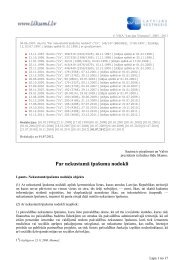Riga - European Capital of Culture 2014 candidate
Riga - European Capital of Culture 2014 candidate
Riga - European Capital of Culture 2014 candidate
- No tags were found...
Create successful ePaper yourself
Turn your PDF publications into a flip-book with our unique Google optimized e-Paper software.
winter carnivalIn addition to a merry hustle and bustle,along with the scent <strong>of</strong> white snow,forests and fields, the approach <strong>of</strong> acolourful and loud group <strong>of</strong> maskedrevellers also brings blessings to eachhome and family. The “Winter Carnival”will be a fun series <strong>of</strong> events takingplace throughout the city territory. Theywill unite the carnivalesque traditions<strong>of</strong> various nations with the characteristics<strong>of</strong> a contemporary carnival.riga – force majeureNew Year’s festivities in <strong>Riga</strong> will ringin the year <strong>of</strong> the <strong>European</strong> <strong>Capital</strong> <strong>of</strong><strong>Culture</strong>.New Year’s Eve – it can safely be said thatthis holiday is celebrated by everyone. Thecollective ringing in <strong>of</strong> the New Year in the<strong>Riga</strong> city centre has become a stable tradition.A countdown <strong>of</strong> the last seconds <strong>of</strong>the passing year takes place and the NewYear is seen in with festive fireworks. Joyand merriment prevail; everyone joins inThe idea <strong>of</strong> a masquerade, based on ancientfertility rites, has historically been familiarto many nations. For the ancient Indo-<strong>European</strong> peoples, the New Year’s Eve wasat the beginning <strong>of</strong> what is now February,and within the Meteņi (Shrovetide) festivities,the ancient traditions <strong>of</strong> seeing <strong>of</strong>f theold year have been retained. Like all thewinter holidays, it included going on mummery(ķekatas) and visits to neighbours. Afeast, gifts and giving presents to the mummersare also the ingredients <strong>of</strong> an ancientritual through which it was hoped to gainprosperity for the home, health for the people,and fertility for cattle and fields.Meteņi is the period in February before fasting,when meat is not eaten and food is muchplainer, therefore the table to mark this prefastingfestival is laid plentifully. The maskedprocessions begun on either Miķelis’ Dayin September or Mārtiņš Day in November,wind up on Meteņi, which for Latvians, alsomarks the mid-way point between the wintersolstice and the spring equinox. Usually,masks portray the spirits that their wearerswant to butter up or affect in some way.Mummers, the jolly assurers <strong>of</strong> fertility andblessings, make their last rounds from houseto house, spreading fertility in every farmsteadthey visit. The masks are the sameshared songs and dances. The culturalinstitutions <strong>of</strong> <strong>Riga</strong> will be open to its townspeopleand visitors, while events at differenttastes will <strong>of</strong>fer a diversity <strong>of</strong> choices forgroups <strong>of</strong> friends or families over severaldays, on the basis <strong>of</strong> the themes outlinedin the <strong>European</strong> Year <strong>of</strong> <strong>Culture</strong> event programme.A videoconference with <strong>Riga</strong>’scooperation partners in various <strong>European</strong>cities will take place.If <strong>Riga</strong> is chosen to be the <strong>European</strong> <strong>Capital</strong><strong>of</strong> <strong>Culture</strong> <strong>2014</strong> promises to be a year filledwith surprising events, unexpected discoveriesand new experiences for everyone.traditional ones – the gypsy, the crane, thebear, the billy-goat, the poor man, the Jew,women dressed as men and men as women.The masks have one purpose – to ensurefertility with singing and dancing, and banishevil through magical goings-on.Maslenitsa is an ancient Orthodox holiday,celebrated seven days before the great fast,or Lent. For seven days, tambourines jangle,the sound <strong>of</strong> accordions can be heard andeveryone is dressed in colourful clothing.Market stalls sag under the weight <strong>of</strong> assorteddelicacies, while pancakes – the symbol<strong>of</strong> the sun – are especially honoured. Duringthe maslenitsa period, everyone should enjoythemselves, and daily visits to other housesor receiving guests in one’s own home are expected.To take advantage <strong>of</strong> the last days <strong>of</strong>winter, everyone must go sledding, ride carousels,play games, sing chastushkas (Russianfolk songs) and endlessly play the fool. One<strong>of</strong> the main types <strong>of</strong> entertainment is the masquerade,where everyone must be dressedup to be completely unrecognizable.What: Winter carnival.Where: Throughout the entire city.When: February <strong>2014</strong>.Concept author and organiser:<strong>Riga</strong>’s ECC task group.For this reason, the New Year’s celebrationsmarking the beginning <strong>of</strong> the year <strong>2014</strong> willalso be special. A magnificent multimedialight and laser show will sketch the vision <strong>of</strong>a future <strong>Riga</strong> – <strong>European</strong> <strong>Capital</strong> <strong>of</strong> <strong>Culture</strong>.What: Ringing in the New Year andprogramme events that last several days.Where: Throughout the entire city.When: December 31 st –January 2 nd 20014..Concept author: <strong>Riga</strong>’s ECC task groupCooperation partners: <strong>Riga</strong> City CouncilDepartment <strong>of</strong> <strong>Culture</strong>, <strong>Riga</strong> culturalinstitutions and hotels.gourmet paradise‘Where have we come from? Where arewe going? And what are we having forlunch?’ once asked the Austrian comedian,Josef Hader, regarding theseas the three most important questionspreying on the minds <strong>of</strong> contemporaryman. The growing selection <strong>of</strong> newtypes <strong>of</strong> food, services and range <strong>of</strong>eating recommendations means wetake many individual decisions everyday. Therefore, a special challenge is todrop in on <strong>European</strong> countries troughthe ‘kitchen door’ and discover what isinteresting and practical in the culinarypropositions <strong>of</strong> different countries.The gastronomy festival is a celebration <strong>of</strong>taste and a journey <strong>of</strong> discovery into thesecrets <strong>of</strong> the menus <strong>of</strong> different <strong>European</strong>countries. During the festival, presentations<strong>of</strong> food preparation traditions fromdifferent countries will be demonstratedin <strong>Riga</strong>’s restaurants and special menuswill be created. It is anticipated that chefswill be invited from different countries tocirque du soleil in riga?<strong>Riga</strong> is the only city in the Baltic Statesto have its own winter circus. Thepublic’s interest in the circus is unflaggingand spectators await new programmeswith great anticipation.Built more than 100 years ago (in 1888), the<strong>Riga</strong> Circus building stands today as it hasalways stood. Throughout its long life, circusperformances have continually been shownhere. Visits to the circus are one <strong>of</strong> the mostpopular types <strong>of</strong> family entertainment.The Cirque du soleil was created in 1984by a group <strong>of</strong> street artists from Quebec,promote a further exchange <strong>of</strong> experience.The closing <strong>of</strong> the festival is plannedas a sophisticated culinary experience for<strong>Riga</strong>’s inhabitants and guests. In KronvaldaPark (Kronvalda parks) near the CongressHouse (Kongresu nams), chefs will demonstratetheir skills and <strong>of</strong>fer samples fortasting. The chefs will work in the open airand during the event, votes will be cast forthe most entertaining chef, the most originalserving method and <strong>of</strong> course, the besttastingfood. On stage, an auction <strong>of</strong> thechefs’ work will take place. There will alsobe a special category <strong>of</strong> food preparation –dishes from different nations prepared fromhealthy products locally grown in Latvia.An Organic Market will take place alongsidethe demonstrations <strong>of</strong> chefs’ skills.The Organic Market – whose initiatorand patron is Mārtiņš Rītiņš, Director <strong>of</strong><strong>Riga</strong>’s Vincents restaurant and president<strong>of</strong> Latvia’s Slow Food Association – in cooperationwith the Latvian Association <strong>of</strong>Biological Agriculture, takes place everyyear in several places in <strong>Riga</strong> and hasearned growing interest from <strong>Riga</strong>’s inhabitants,especially devotees <strong>of</strong> healthy food.and its performances have been watchedby almost 40 million people in 90 citiesthroughout the world. But not yet in <strong>Riga</strong>.Why not in <strong>Riga</strong>?What/Where/When: To be announcedfollowing coordination.Concept author: <strong>Riga</strong>’s ECC task group.What: Culinary festival and campaigns in<strong>Riga</strong>’s restaurants.Where: Congress House square.When: June <strong>2014</strong>.Concept author: Sarma Freiberga, MārtiņšRītiņš.Cooperation partners: Association <strong>of</strong>Hotels and Restaurants in Latvia, Chefs’Club, Latvia’s Slow Food Association,Latvian Association <strong>of</strong> BiologicalAgriculture, x-aģentūra.90 91


